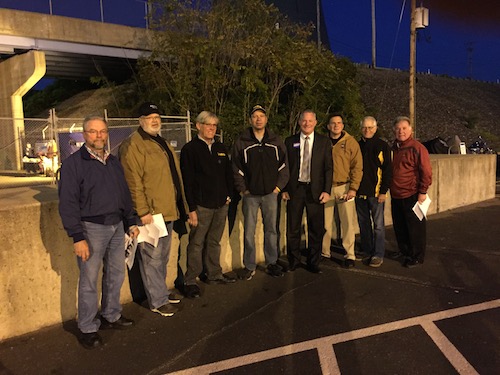Pennsylvania has nearly 1 million more registered Democrats than Republicans, according to the commonwealth’s Department of State.
But Republicans hold substantial majorities in the state Legislature because they hold the keys to legislative mapping, carving out broad swaths of GOP territory and isolating Democrats. This could change if the IBEW and progressive activists get out the vote on Nov. 3.
They are mobilizing on behalf of candidates for the Pennsylvania Supreme Court, which holds sway over a commission that draws the legislative boundaries and other matters important to working families.
“This is a full labor push,” said Brian Eddis, a Philadelphia Democratic ward leader, member of the bricklayers’ union and campaign manager for candidate Kevin Dougherty. “It’s not just the IBEW. All of labor is out and is strong. We’re working extremely hard.”
The court appoints one of five members to the state’s Legislative Reapportionment Committee, which sets the legislative boundaries for the General Assembly following the federal census every 10 years. The other four are appointed by the Legislature itself and are divided evenly between Democrats and Republicans.
 |
| Pennsylvania Supreme Court candidate Kevin Dougherty is surrounded by supporters preparing to greet workers at the Beaver Valley Nuclear Station in Shippingport on Oct. 21, From left are Jim Britsch, Pittsburgh Local 29 president; Glen Camp, Local 29 senior business representative; Jeff Davis, Local 29 business manager; Jim DePoe, Local 29 vice president; Dougherty; Frank Snyder, secretary/treasurer of the Pennsylvania AFL-CIO; Don Siegel, Third District international vice president; and Joe Spanek, Beaver County commissioner.
|
In 2010, Republicans controlled the court and appointed a right-leaning representative that Eddis and others said favored Republicans. The seven-member state Supreme Court has three openings for the first time and the four returning justices are split evenly between Democrats and Republicans.
A Democratic majority on the court could tilt the balance on the reapportionment committee. It also might slow the Republicans from pushing for right-to-work legislation in Pennsylvania, Eddis said.
In the state Legislature, the GOP has a 119-84 advantage in the House and 30-19 with one open seat in the Senate. The U.S. congressional delegation includes 13 Republican members representing Pennsylvania, compared to just five Democrats.
Eddis said a higher turnout improves the chances for a labor victory in November. That view is shared by international representative and IBEW Pennsylvania Political Director Mike Welsh, who says he’s treating this “like a normal presidential election.”
“That’s what it is going to come down to,” Welsh said of a higher turnout. “We have enough labor people in place that we can win this election.”
Garnering much of labor’s support is Dougherty, a Philadelphia Common Pleas Court administrative judge and the brother of Local 98 Business Manager John Dougherty. State Superior Court Judges Christine Donohue and David Wecht are the other Democratic candidates. Three Republicans and one independent are running. Judges serve a 10-year term.
Dougherty was appointed to his current post in 2001, when then-Republican Gov. Tom Ridge selected him to fill a vacancy. He has been elected to two, 10-year terms since. Dougherty has raised $3.6 million for his campaign, according to the Associated Press, the highest of any candidate.
He is a 1988 graduate of Antioch Law School in Washington and was given a recommended rating by the Pennsylvania Bar Association’s Judicial Evaluation Commission. Most of his work in the common pleas court has been in the family division, where he deals in cases involving troubled juveniles.
Dougherty has been endorsed by Gov. Tom Wolf and retired State Supreme Court Chief Justice Steven Zappala, plus many of the state’s unions. Ennis said that’s made Dougherty the subject of attacks from the far right, but he’s confident both union and nonunion voters will look past that because of his long tenure as head of the common pleas court.
“He has a record of reform that has saved taxpayers millions of dollars,” Eddis said. “As a judge, he has a reputation of being tough but fair.”
The impact of a Republican-dominated Legislature has been softened a bit by the arrival of Wolf, who took office in January. But the state has not been able to approve a budget this year. Under a Republican governor in 2013, legislation was passed and signed into law that reduced unemployment benefits for seasonal workers, many of whom work in construction.
Much of the state’s media has noted low voter turnout is common in judicial elections, especially during a non-presidential year, and that traditionally helps Republican candidates.
Welsh and fellow IBEW members are working with other unions to get voters out, participating in phone banks and canvassing neighborhoods. Eddis said he’s optimistic with two weeks left before the election, but is concerned that an anti-union, pro-corporate group will dump substantial money into the race during the closing days.
“You hear it all the time, that this is the most important election,” Eddis said. “But for labor, this really is the most important election.”